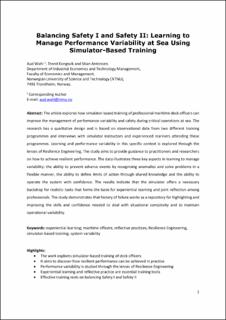| dc.contributor.author | Wahl, Aud Marit | |
| dc.contributor.author | Kongsvik, Trond | |
| dc.contributor.author | Antonsen, Stian | |
| dc.date.accessioned | 2020-04-21T11:04:59Z | |
| dc.date.available | 2020-04-21T11:04:59Z | |
| dc.date.created | 2019-10-25T09:09:34Z | |
| dc.date.issued | 2019 | |
| dc.identifier.citation | Reliability Engineering & System Safety. 2019, 195 . | en_US |
| dc.identifier.issn | 0951-8320 | |
| dc.identifier.uri | https://hdl.handle.net/11250/2651867 | |
| dc.description.abstract | The article explores how simulator-based training of professional maritime deck officers can improve the management of performance variability and safety during critical operations at sea. The research has a qualitative design and is based on observational data from two different training programmes and interviews with simulator instructors and experienced mariners attending these programmes. Learning and performance variability in this specific context is explored through the lenses of Resilience Engineering. The study aims to provide guidance to practitioners and researchers on how to achieve resilient performance. The data illustrates three key aspects in learning to manage variability: the ability to prevent adverse events by recognising anomalies and solve problems in a flexible manner, the ability to define limits of action through shared knowledge and the ability to operate the system with confidence. The results indicate that the simulator offers a necessary backdrop for realistic tasks that forms the basis for experiential learning and joint reflection among professionals. The study demonstrates that history of failure works as a repository for highlighting and improving the skills and confidence needed to deal with situational complexity and to maintain operational variability. | en_US |
| dc.language.iso | eng | en_US |
| dc.publisher | Elsevier | en_US |
| dc.rights | Attribution-NonCommercial-NoDerivatives 4.0 Internasjonal | * |
| dc.rights.uri | http://creativecommons.org/licenses/by-nc-nd/4.0/deed.no | * |
| dc.title | Balancing Safety I and Safety II: Learning to Manage Performance Variability at Sea Using Simulator-Based Training | en_US |
| dc.type | Peer reviewed | en_US |
| dc.type | Journal article | en_US |
| dc.description.version | acceptedVersion | en_US |
| dc.source.pagenumber | 10 | en_US |
| dc.source.volume | 195 | en_US |
| dc.source.journal | Reliability Engineering & System Safety | en_US |
| dc.identifier.doi | 10.1016/j.ress.2019.106698 | |
| dc.identifier.cristin | 1740452 | |
| dc.relation.project | Norges forskningsråd: 256074 | en_US |
| dc.description.localcode | © 2019. This is the authors’ accepted and refereed manuscript to the article. Locked until 14.10.2021 due to copyright restrictions. This manuscript version is made available under the CC-BY-NC-ND 4.0 license http://creativecommons.org/licenses/by-nc-nd/4.0/ " | en_US |
| cristin.ispublished | true | |
| cristin.fulltext | postprint | |
| cristin.qualitycode | 2 | |

